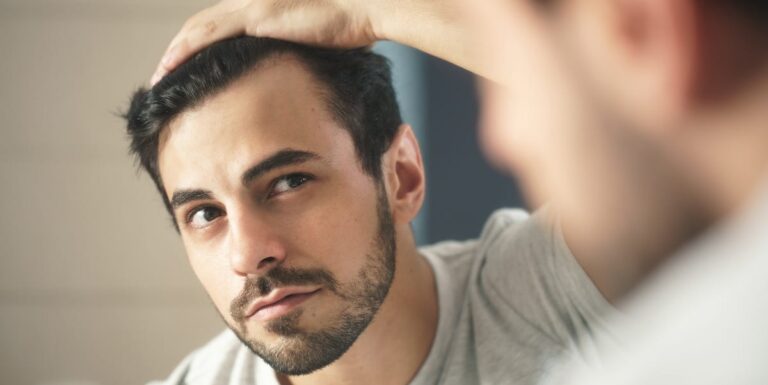Creatine is a useful tool if you want to gain muscle. Like many supplements, there are side effects. But in this case, hair loss is not one of them.
Creatine is a compound found in meat products that occurs naturally in the body and aids in muscle building functions. Taking the supplement in conjunction with a weight training routine has been proven to promote muscle growth. And it’s incredibly safe. Some side effects of supplementing with creatine, such as muscle cramps and dehydration, are all anecdotal.
So why does everyone keep spreading rumors that creatine causes hair loss?
One of the reasons is that hair loss is a major concern for most men. According to the Cleveland Clinic, nearly 70 percent of men will experience the condition at some point in their lives, and it’s largely due to their genetic makeup. Protecting the hair you have left means avoiding things that can make it worse. Creatine has long been considered one of those threats.
Substantial new research has since debunked that myth. According to Dr. Jose Antonio, an exercise physiologist at Nova Southeastern University, “Creatine has been the subject of more than 500 scientific studies. No other food or dietary supplement has more supporting data. .”
And among all that data, nothing points to hair loss as a side effect of taking creatine. Although research is still ongoing, “the current body of evidence does not show that creatine causes hair loss or baldness,” Antonio says.
Does creatine cause hair loss?
The hair loss rumors stem from a single study conducted in South Africa in 2009 in which a group of college rugby players took creatine daily for three weeks. The study showed a “statistically significant” increase in dihydrotestosterone (DHT) levels in participants. Dihydrotestosterone (DHT) is a byproduct of testosterone that at high concentrations can shrink hair follicles, shorten hair growth cycles, and cause hair thinning.
However, according to Antonio, who, along with a team of internationally renowned researchers, reviewed the most common creatine misconceptions in the International Journal of Sports Nutrition, none of the rugby players who took part in the study were actually affected by creatine. None of them experienced hair loss. Take supplements. Additionally, study participants who received creatine started with baseline DHT levels 23% lower than those in the placebo group, and the measured increases in DHT “remained well within normal clinical limits.” In other words, their DHT levels started low and stayed low. “‘Statistically significant’ is not the same as physiologically significant,” Antonio says.
Twelve other clinical trials have investigated the effects of creatine supplements on testosterone, but so far none have replicated the South African study’s findings. Nevertheless, this study spread on social media, giving rise to rumors that creatine causes hair loss.
First of all, what is creatine?
Creatine is just an amino acid derivative. This helps produce and store the molecule phosphocreatine (PCR), which muscles use to generate energy for short, high-intensity exercise. Antonio laments creatine’s bad reputation. “I’ve been drinking for 25 years,” he says.
He cites research showing that creatine helps improve memory and brain function and may benefit patients with neuromuscular diseases, type 2 diabetes, Parkinson’s disease, Alzheimer’s disease, and traumatic brain injury. Masu. Supplements may also help limit the amount of damage caused by a concussion. Creatine works synergistically with exercise to slow and even reverse age-related muscle loss (sarcopenia).
Related articles
What other side effects does creatine have?
Creatine is not approved as a drug by the FDA, but it is designated as GRAS (Generally Recognized as Safe) by the Food and Drug Administration. When used correctly, creatine has few side effects other than some weight gain, which usually results in a loss of muscle mass.
There have been a few case reports of kidney damage, blood sugar concerns, heart problems, muscle spasms and strains, dehydration, and diarrhea. However, there is no evidence that these symptoms are caused by creatine itself rather than something else.
A study published in the International Journal of Sport Nutrition and Exercise Metabolism suggests that caffeine may reduce the effectiveness of creatine, but more research is needed. Leslie Bonci, a sports nutritionist for the Kansas City Chiefs, cautions that creatine won’t work for everyone. Because creatine is a naturally occurring organic compound found in most meats and fish, creatine supplements may be more beneficial for vegetarians who “do not already consume creatine as part of their daily diet.” Bonci says.
Men considering adding creatine to their diet should visit a reputable health food or vitamin and nutrition store, says MH Dermatology Advisor Adnan Nasir, M.D. The supplement is available in powder, tablet, and energy sources. Available as a bar or drink mix. Learn how to buy effective creatine supplements here.
Men with underlying kidney disease should consult their doctor before going home with a keg of powder. And stick to the recommended amount: usually 3 to 5 grams per day. Guzzling 20 grams at a time won’t transform you into the Hulk overnight. Creatine is water-soluble, so if you take too much, you’re literally flushing money down the toilet. At least you can be sure that you won’t end up finding hair around your shower drain because of creatine.
Related articles
Source link

